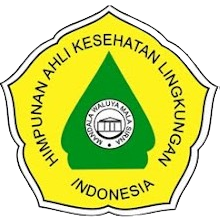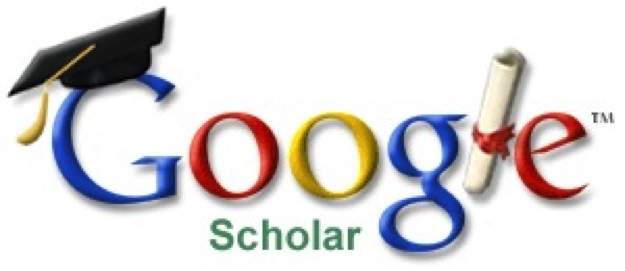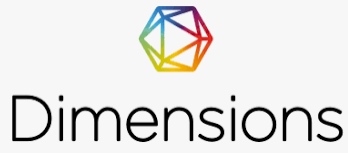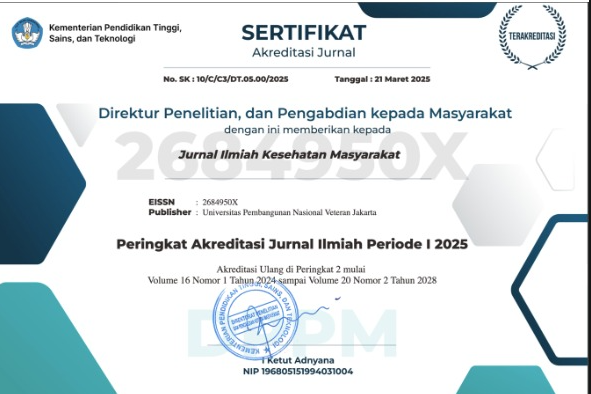Pengelolaan Limbah Infeksius Rumah Tangga dalam Masa Pandemi Covid-19
Abstract
Abstrak
Latar belakang: Limbah medis infeksius dalam masa pandemi COVID-19 berpotensi menjadi media penyebaran virus jika tidak dikelola dengan benar. Kurangnya informasi di masyarakat tentang pengelolaan limbah infeksius rumah tangga termasuk faktor yang memengaruhi cara pengelolaannya. Tulisan ini menjelaskan penanganan limbah infeksius rumah tangga, dari sumber sampai penanganan lanjutan. Tujuan penelitian ini untuk mengetahui pengertian, jenis, dan cara mengelola limbah infeksius rumah tangga pada masa pandemi COVID-19.
Metode: Penelitian dilakukan dalam bentuk kajian pustaka jurnal, artikel, pedoman kesehatan dan lingkungan yang berlaku secara nasional maupun internasional. Proses pencarian menggunakan kata kunci, yaitu pengelolaan limbah infeksius pada masa COVID-19 dan limbah infeksius rumah tangga. Diperoleh 31 artikel sesuai kata kunci. Setelah disaring menggunakan kriteria inklusi, diperoleh 4 artikel yang di-review. Kriteria inklusi yang digunakan adalah jurnal dan artikel kesehatan dengan kata kunci pengelolaan limbah infeksius pada masa pandemi, serta rentang tahun terbit dari tahun 2020-2021. Sedangkan, kriteria eksklusi yang digunakan, yakni jurnal dan artikel kesehatan yang tidak berhubungan dengan pengelolaan limbah infeksius pada masa pandemi, serta jurnal dan artikel yang terbit sebelum tahun 2020.
Hasil: Didapatkan hasil berupa pengelolaan limbah rumah tangga, yaitu dengan pemilahan, pewadahan, dan disinfeksi. Penanganan lanjutannya dapat dilakukan melalui cara pengangkutan dengan sarana khusus dan tanpa sarana khusus.
Kesimpulan: Hasil penelitian menunjukkan pentingnya menerapkan cara pengolahan limbah infeksius dengan baik dan benar, serta pentingnya bekerja sama antar pemerintah dan masyarakat sesuai perannya. Peran Pemerintah Daerah, komunitas, dan keluarga dibutuhkan dalam penanganan limbah infeksius skala rumah tangga.
Kata kunci: COVID-19, Limbah infeksius rumah tangga, Pengelolaan limbah, Limbah infeksius
Abstract
Background: Infectious medical waste during the COVID-19 pandemic becomes a virus dissemination medium if it is not managed properly. Lack of information in the community about household infectious waste management is one factor that affects how to manage infectious medical waste. This article describes household infectious waste management from the source to further treatment. The purpose of this research is to know the definition, determine the types, and learn how to manage household infectious waste during the COVID-19 pandemic. Methods: The method is a literature review of journals, articles, and health and environmental guidelines that apply nationally and internationally. The search process was carried out using keywords such as the management of COVID-19 infectious waste and household infectious waste. The results were obtained from 31 articles according to keywords. After being filtered using inclusion criteria, four articles were reviewed. The inclusion criteria were health journals and articles with the keywords infectious waste management during the pandemic and the range of years of publication from 2020-2021. Meanwhile, the exclusion criteria were health journals and articles with problem topics not related to infectious waste management during the pandemic and journals and articles published before 2020.
Result: The result of this paper is the management of waste from households that is by sorting, storing, and disinfecting. Further treatment can be done in 2 ways. Those are transportation by ad hoc services and without ad hoc.
Conclusion: The result shows that it is crucial to implement the method of managing infectious waste properly. It is also essential to build cooperation between the government and the community. The role of local governments, communities, and families is needed in handling household infectious waste so that the household infectious waste treatment process becomes effective.
Keywords: COVID-19, Household infectious waste, Waste management, Infectious waste.
References
Annisa D. Situasi Terkini Perkembangan Coronavirus Disease (COVID-19) 18 September 2021 [Internet]. Kementerian Kesehatan RI. 2021. Available from: https://covid19.kemkes.go.id/situasi-infeksi-emerging/situasi-terkini-perkembangan-coronavirus-disease-covid-19-18-september-2021
Kementerian Kesehatan. Pocket book for infectious waste management (Indonesian) [Internet]. Kementerian Kesehatan RI. 2020. p. 1–12. Available from: https://www.unicef.org/indonesia/media/7441/file/Pocket book for infectious waste management (Indonesian).pdf
Prihartanto. Penelitian-Penelitian Tentang Timbulan Limbah B3 Medis dan Rumah Tangga Selama Bencana Pandemic Covid-19. J ALAMI J Teknol Reduksi Risiko Bencana. 2020 Jan;4(2):134–41.
Nurali I. Pedoman Pengelolaan Limbah Rumah Sakit Rujukan, Rumah Sakit Darurat Dan Puskesmas yang Menangani Pasien Covid-19. In Jakarta: Kementerian Kesehatan RI; 2020.
Amalia V, Hadisantoso EP, Wahyuni IR, Supriatna AM. Penanganan Limbah Infeksius Rumah Tangga Pada Masa Wabah COVID-19. 2020.
Nugraha C. Tinjauan Kebijakan Pengelolaan Limbah Medis Infeksius Penanganan Corona Virus Disease 2019 (Covid-19). J Untuk Masy Sehat. 2020;4(2):216–29.
Axmalia A, Sinanto RA. Pengelolaan Limbah Infeksius Rumah Tangga pada masa Pandemi COVID-19. J Kesehat Komunitas. 2021;7(1):70–6.
Laelasari E. Manajemen Pengelolaan Limbah Medis Rumah Tangga Era Pandemi Covid-19 di Indonesia: Narrative Literature. Pros Semin Nas Penelit dan Pengabdi [Internet]. 2021;1(1):447–58. Available from: http://prosiding.rcipublisher.org/index.php/prosiding/article/view/174/53
Nasir AM. Begini cara kelola limbah masker di masyarakat untuk cegah penularan COVID-19 [Internet]. Kementerian Kesehatan Republik Indonesia. 2020. Available from: https://infeksiemerging.kemkes.go.id/warta-infem/begini-cara-kelola-limbah-masker-di-masyarakat-untuk-cegah-penularan-covid-19
Kementerian Lingkungan Hidup dan Kehutanan. Surat Edaran Menteri Lingkungan Hidup dan Kehutanan Nomor SE.2/MENLHK/PSLB3/PLB.3/2020. 2020. p. Hal 1-3.
Menteri Pekerjaan Umum RI. Permen PU Nomor 3/PRT/M/ 2013 tentang penyelenggaraan prasarana dan sarana persampahan dalam penanganan sampah rumah tangga dan sampah sejenis sampah rumah tangga. Permen pu nomor 3/prt/m/ 2013 [Internet]. 2013;Nomor 65(879):2004–6. Available from: https://peraturan.bpk.go.id/Home/Details/144707/permen-pupr-no-03prtm2013-tahun-2013
ACR. Municipal waste management and COVID-19 [Internet]. 2020. Available from: https://www.acrplus.org/en/municipal-waste-management-covid-19
Bank AD. Managing Infectious Medical Waste during the COVID-19 Pandemic. 2020;2:7.
Association of Cities and Regions, for sustainable Resource management. Municipal waste management and covid-19. 2020.
Badan Penelitian dan Pengembangan Kementerian Pekerjaan Umum dan Perumahan Rakyat. Teknologi Recycling Sampah (TPS3R) [Internet]. 2019. Available from: http://elearning.litbang.pu.go.id/teknologi/TPS3R#:~:text=Tempat Pengelolaan Sampah Reduce%2C Reuse,ditimbulkannya%2C khususnya di kawasan wisata.









.jpg)








